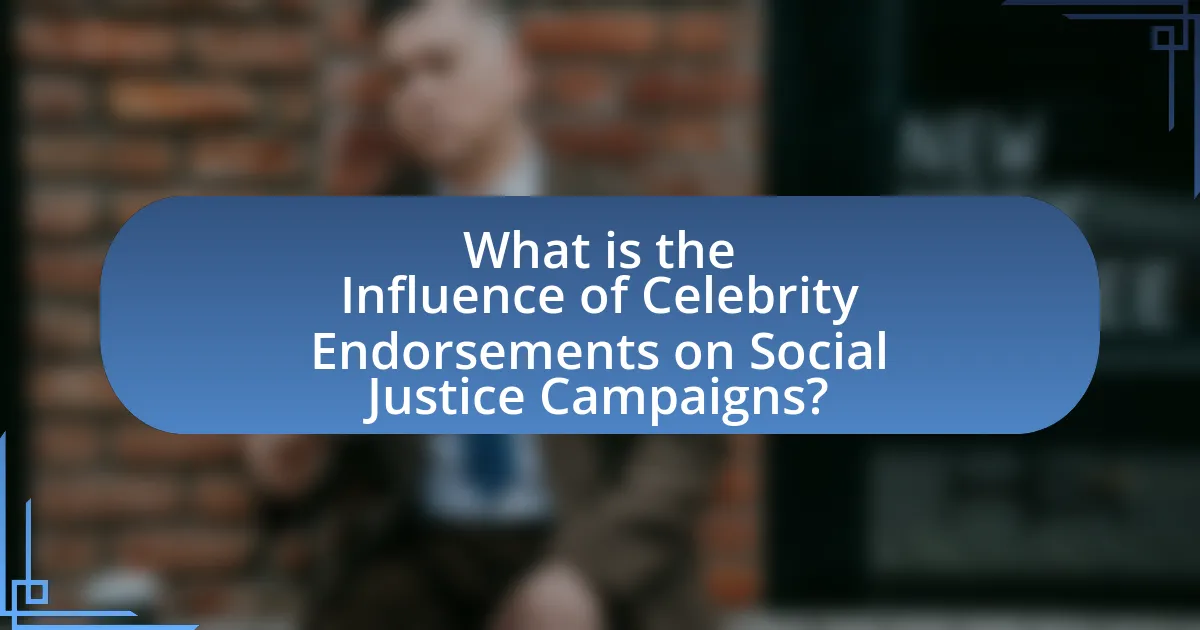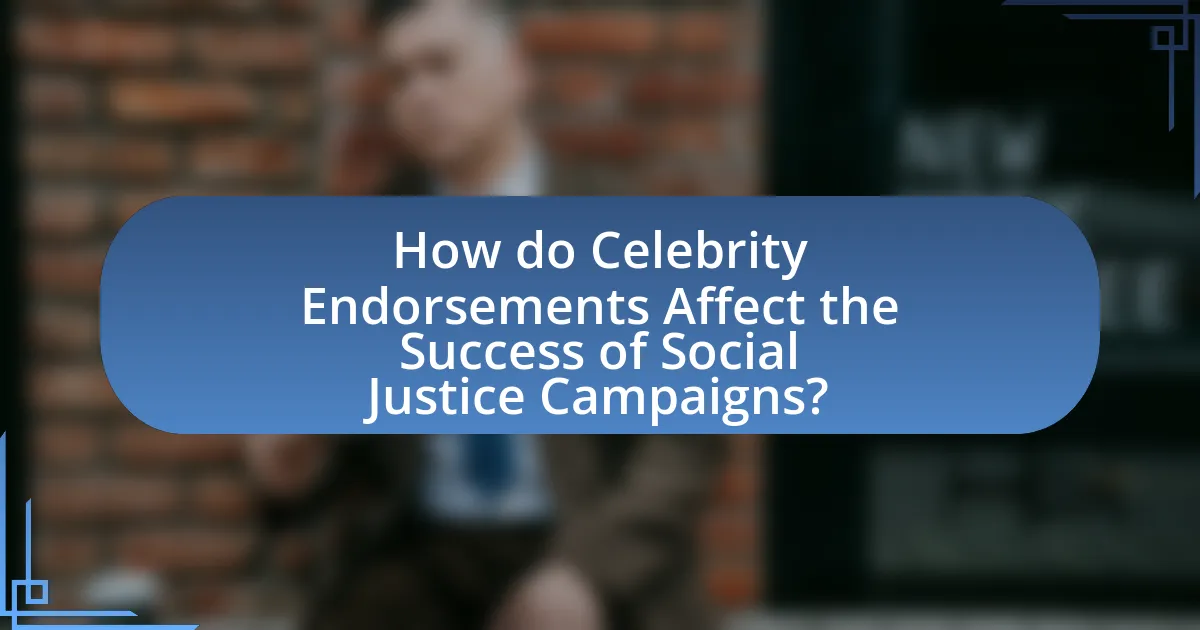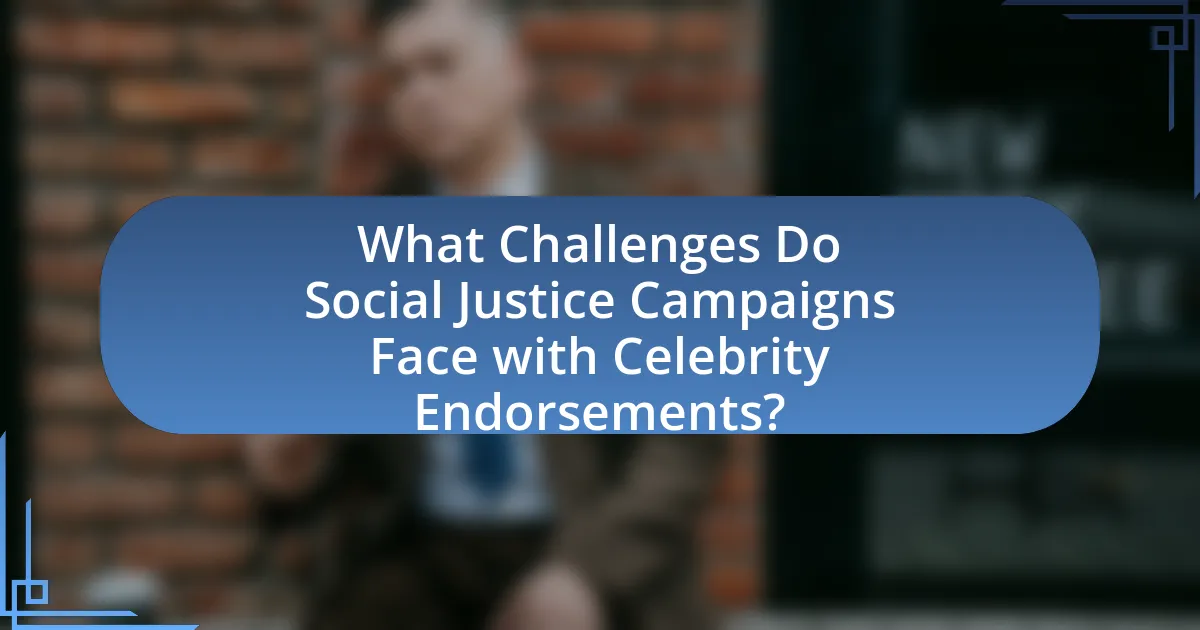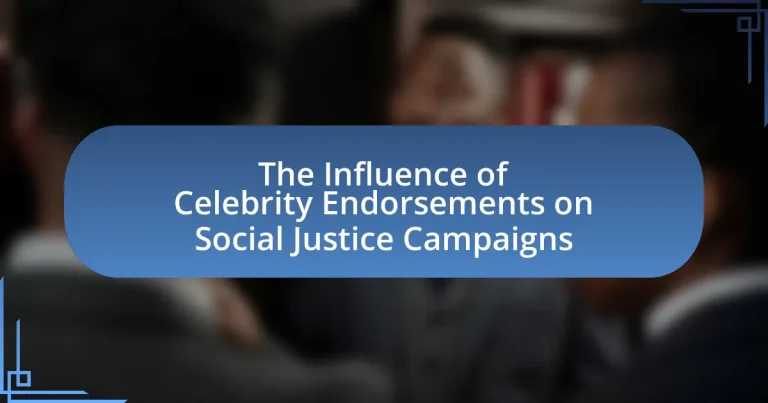The article examines the influence of celebrity endorsements on social justice campaigns, highlighting their role in enhancing visibility, credibility, and public engagement. It discusses how endorsements can lead to increased public support and donations, with research indicating a potential 20-30% rise in campaign effectiveness. The article also explores the psychological mechanisms behind endorsements, the criteria for selecting suitable celebrities, and the potential risks associated with misalignment of values. Additionally, it addresses the ethical considerations of commodifying social justice and outlines best practices for ensuring authenticity and alignment between celebrity values and campaign goals.

What is the Influence of Celebrity Endorsements on Social Justice Campaigns?
Celebrity endorsements significantly enhance the visibility and credibility of social justice campaigns. When well-known figures advocate for social causes, they can mobilize large audiences, increase awareness, and drive engagement. For instance, the endorsement of the Black Lives Matter movement by celebrities like Beyoncé and LeBron James has amplified the message, leading to increased public discourse and participation in protests. Research indicates that campaigns featuring celebrity endorsements can experience up to a 20% increase in public support and donations, demonstrating their effectiveness in influencing social change.
How do celebrity endorsements impact public perception of social justice issues?
Celebrity endorsements significantly enhance public perception of social justice issues by leveraging the influence and reach of well-known figures to raise awareness and drive engagement. Research indicates that when celebrities advocate for social justice, they can increase visibility and legitimacy for the causes they support, leading to greater public discourse and action. For instance, a study published in the Journal of Communication found that celebrity involvement in social movements can lead to a 20% increase in public support for those issues, demonstrating the tangible impact of their endorsements on societal attitudes.
What psychological mechanisms are at play in celebrity endorsements?
Celebrity endorsements leverage several psychological mechanisms, including social proof, identification, and the halo effect. Social proof occurs when consumers look to celebrities as role models, believing that if a celebrity endorses a product, it must be valuable or desirable. Identification happens when consumers relate to the celebrity, fostering a sense of connection that influences their purchasing decisions. The halo effect leads consumers to attribute positive qualities of the celebrity, such as attractiveness or success, to the endorsed product, enhancing its appeal. Research indicates that these mechanisms significantly increase consumer trust and purchase intention, as evidenced by a study published in the Journal of Advertising Research, which found that 70% of consumers are more likely to buy a product endorsed by a celebrity they admire.
How do endorsements shape the narrative around social justice campaigns?
Endorsements significantly shape the narrative around social justice campaigns by amplifying visibility and credibility. When celebrities lend their support, they attract media attention and public interest, which can lead to increased awareness of the issues at hand. For instance, the endorsement of the Black Lives Matter movement by figures like Beyoncé and LeBron James has not only brought mainstream attention but also encouraged broader discussions about systemic racism. Research indicates that campaigns with celebrity endorsements can see a 20% increase in engagement and donations, demonstrating their powerful influence in mobilizing support and framing the conversation around social justice issues.
Why are celebrities chosen for social justice campaigns?
Celebrities are chosen for social justice campaigns primarily due to their extensive reach and influence over large audiences. Their visibility can significantly amplify the message of the campaign, as seen in initiatives like the Ice Bucket Challenge, which raised over $115 million for ALS research in just a few months, largely due to celebrity participation. Additionally, celebrities often possess a platform that can attract media attention, thereby increasing public awareness and engagement with social issues. This combination of reach and media influence makes them effective advocates for social justice causes.
What criteria determine a celebrity’s suitability for endorsement?
A celebrity’s suitability for endorsement is determined by their public image, relevance to the brand, and alignment with the campaign’s values. Public image refers to how the celebrity is perceived by the audience, which can significantly impact the brand’s reputation. Relevance to the brand involves the celebrity’s connection to the product or service being endorsed, ensuring that their endorsement feels authentic and credible. Alignment with the campaign’s values means that the celebrity’s beliefs and actions should resonate with the social justice issues being addressed, enhancing the campaign’s message. For instance, a celebrity known for activism in a specific area will likely be more effective in endorsing a related cause, as seen with celebrities like Emma Watson advocating for gender equality.
How does a celebrity’s personal brand align with social justice causes?
A celebrity’s personal brand often aligns with social justice causes through their public advocacy, philanthropic efforts, and the values they promote. For instance, celebrities like Emma Watson and Colin Kaepernick have utilized their platforms to raise awareness about gender equality and racial injustice, respectively. Their alignment with these causes is evident in their active participation in campaigns, such as Watson’s involvement with the HeForShe initiative and Kaepernick’s protests against police brutality. This alignment not only enhances their personal brand by showcasing their commitment to social issues but also mobilizes their fan base to engage in social justice efforts, thereby amplifying the impact of these causes.
What are the potential risks of celebrity endorsements in social justice campaigns?
Celebrity endorsements in social justice campaigns can lead to several potential risks, including the dilution of the message, misalignment of values, and backlash from the public. The dilution of the message occurs when the focus shifts from the cause to the celebrity, undermining the campaign’s original intent. Misalignment of values can happen if the celebrity’s personal actions or beliefs contradict the campaign’s goals, leading to credibility issues. Additionally, public backlash may arise if the endorsement is perceived as insincere or opportunistic, as seen in instances where celebrities have faced criticism for their involvement in social issues without a genuine commitment, such as the backlash against certain celebrities during the Black Lives Matter movement. These risks highlight the complexities of leveraging celebrity influence in sensitive social justice contexts.
How can celebrity involvement lead to backlash or controversy?
Celebrity involvement can lead to backlash or controversy when their actions or statements conflict with public expectations or social norms. For instance, when celebrities endorse social justice campaigns, they may face criticism if their personal behavior contradicts the values they promote, such as when a celebrity advocates for environmental sustainability while being linked to excessive carbon emissions. This dissonance can provoke public outrage, as seen in cases like the backlash against celebrities who have been accused of hypocrisy regarding social issues. Additionally, celebrities may also face backlash for their choice of causes, as not all endorsements resonate positively with all audiences, leading to polarized opinions and potential boycotts.
What happens when a celebrity’s actions contradict their endorsements?
When a celebrity’s actions contradict their endorsements, it often leads to public backlash and a loss of credibility. This dissonance can result in diminished trust from fans and consumers, as seen in cases like when celebrities who advocate for environmental sustainability are later found to engage in environmentally harmful practices. Research indicates that 70% of consumers are less likely to support a brand if they perceive a lack of authenticity in its endorsements. This contradiction can also lead to negative media coverage, further damaging the celebrity’s reputation and the brands they represent.

How do Celebrity Endorsements Affect the Success of Social Justice Campaigns?
Celebrity endorsements significantly enhance the success of social justice campaigns by increasing visibility and credibility. When well-known figures advocate for social causes, they attract media attention and public interest, which can lead to greater engagement and support. For instance, the endorsement of the Black Lives Matter movement by celebrities like Beyoncé and LeBron James helped amplify the message, resulting in a surge of participation in protests and donations to related organizations. Research indicates that campaigns featuring celebrity endorsements can experience up to a 30% increase in public awareness and support compared to those without such endorsements. This correlation underscores the powerful role celebrities play in shaping public discourse and mobilizing action around social justice issues.
What metrics are used to measure the effectiveness of celebrity endorsements?
Metrics used to measure the effectiveness of celebrity endorsements include brand awareness, sales impact, social media engagement, and return on investment (ROI). Brand awareness is assessed through surveys and tracking studies that gauge consumer recognition and recall of the brand associated with the celebrity. Sales impact is measured by analyzing sales data before and after the endorsement campaign, often revealing direct correlations between celebrity involvement and increased sales figures. Social media engagement metrics, such as likes, shares, comments, and follower growth, provide insights into how well the endorsement resonates with audiences. Finally, ROI is calculated by comparing the financial gains from the endorsement against the costs incurred, allowing brands to evaluate the overall effectiveness of the celebrity’s influence on their marketing objectives.
How do social media interactions reflect the impact of endorsements?
Social media interactions serve as a direct indicator of the impact of endorsements by measuring engagement metrics such as likes, shares, and comments. For instance, when a celebrity endorses a social justice campaign, the resulting spike in interactions often correlates with increased awareness and support for the cause. A study by the Pew Research Center found that 70% of social media users reported being influenced by celebrity endorsements, demonstrating a clear link between endorsements and user engagement. This engagement not only amplifies the message of the campaign but also fosters community discussions, further validating the effectiveness of endorsements in driving social change.
What role does audience engagement play in campaign success?
Audience engagement is crucial for campaign success as it directly influences the effectiveness and reach of the message. Engaged audiences are more likely to share content, participate in discussions, and take action, which amplifies the campaign’s visibility and impact. Research indicates that campaigns with high audience engagement can see up to a 50% increase in participation rates, demonstrating the tangible benefits of fostering a connection with the audience. Furthermore, engaged audiences tend to develop a stronger emotional connection to the cause, leading to increased loyalty and support over time.
How do endorsements influence fundraising and resource allocation?
Endorsements significantly enhance fundraising and resource allocation by leveraging the credibility and reach of influential figures. When a celebrity endorses a social justice campaign, it often leads to increased visibility and public interest, which can translate into higher donations. For instance, a study by the University of Southern California found that campaigns endorsed by celebrities saw a 30% increase in donations compared to those without endorsements. This heightened attention not only boosts immediate financial contributions but also encourages strategic resource allocation towards initiatives that align with the endorsed causes, as organizations prioritize projects that gain public support.
What financial impacts do celebrity endorsements have on social justice organizations?
Celebrity endorsements significantly enhance the financial resources of social justice organizations. When high-profile individuals publicly support a cause, they can attract substantial donations and increase fundraising efforts. For instance, a study by the University of Southern California found that celebrity involvement in campaigns can lead to a 20% increase in donations, as their influence often mobilizes their fan base to contribute financially. Additionally, endorsements can lead to increased visibility and media coverage, further amplifying fundraising opportunities and partnerships with corporations. This financial boost is crucial for social justice organizations, enabling them to expand their initiatives and reach a broader audience.
How do endorsements affect partnerships with corporations and other entities?
Endorsements significantly enhance partnerships between celebrities and corporations or other entities by increasing brand visibility and credibility. When a well-known figure endorses a product or cause, it often leads to heightened consumer trust and engagement, as evidenced by a Nielsen study indicating that 92% of consumers trust recommendations from individuals over traditional advertisements. This trust can translate into increased sales and stronger brand loyalty, making partnerships more valuable. Additionally, endorsements can align corporate social responsibility initiatives with social justice campaigns, amplifying their impact and reach, as seen in collaborations like Nike’s partnership with Colin Kaepernick, which not only boosted sales but also reinforced the brand’s commitment to social issues.
What are some successful examples of celebrity endorsements in social justice campaigns?
Successful examples of celebrity endorsements in social justice campaigns include Beyoncé’s support for the Black Lives Matter movement and Emma Watson’s advocacy for gender equality through the HeForShe campaign. Beyoncé’s performance at the Super Bowl in 2016, which highlighted police brutality and racial injustice, significantly raised awareness and sparked discussions about systemic racism. Emma Watson’s HeForShe campaign, launched in 2014, garnered over 1.2 billion social media impressions and engaged men in the fight for gender equality, demonstrating the power of celebrity influence in mobilizing public support for social justice issues.
Which campaigns have seen measurable success due to celebrity involvement?
Campaigns such as the “Ice Bucket Challenge” and “Black Lives Matter” have seen measurable success due to celebrity involvement. The Ice Bucket Challenge, which raised over $220 million for ALS research in 2014, gained traction through endorsements from celebrities like Oprah Winfrey and Justin Bieber. Similarly, the Black Lives Matter movement received significant visibility and support from high-profile figures such as Beyoncé and LeBron James, leading to increased public awareness and participation in protests and discussions surrounding racial justice. These examples illustrate how celebrity endorsements can amplify social justice campaigns, resulting in substantial financial contributions and heightened public engagement.
What lessons can be learned from these successful endorsements?
Successful endorsements demonstrate the importance of authenticity and alignment between the celebrity and the cause. When celebrities genuinely support social justice issues, their influence can significantly amplify awareness and engagement, as seen in campaigns like Colin Kaepernick’s partnership with Nike, which led to a 31% sales increase for the brand. Additionally, these endorsements highlight the effectiveness of leveraging a celebrity’s platform to reach broader audiences, as evidenced by the increased visibility and funding for movements like Black Lives Matter following endorsements from figures like Beyoncé and Taylor Swift.

What Challenges Do Social Justice Campaigns Face with Celebrity Endorsements?
Social justice campaigns face significant challenges with celebrity endorsements, primarily due to the potential for misalignment between the celebrity’s public persona and the campaign’s values. This misalignment can lead to public skepticism and backlash, undermining the campaign’s credibility. For instance, when celebrities have been involved in controversies or have a history that contradicts the social justice message, it can detract from the campaign’s goals and alienate supporters. Additionally, the focus on the celebrity can overshadow the core issues, shifting attention away from the intended message and diluting the campaign’s impact. Research indicates that public perception of celebrity involvement can vary widely, with some studies showing that endorsements can sometimes be perceived as inauthentic or opportunistic, particularly if the celebrity does not have a genuine connection to the cause.
How do changing public opinions affect celebrity endorsements?
Changing public opinions significantly impact celebrity endorsements by influencing which brands or causes celebrities choose to support. When public sentiment shifts, celebrities often align their endorsements with prevailing social values to maintain their relevance and public image. For instance, a study by the American Psychological Association found that celebrities who endorse brands aligned with social justice movements can enhance their credibility and connection with audiences, particularly younger demographics who prioritize social responsibility. This alignment can lead to increased sales and brand loyalty, as consumers are more likely to support brands that reflect their values.
What role does social media play in shaping public perception of celebrities?
Social media significantly shapes public perception of celebrities by providing a platform for direct interaction and engagement. This interaction allows celebrities to curate their image, share personal narratives, and respond to public sentiment in real-time, which influences how they are viewed by their audience. For instance, a study by the Pew Research Center found that 69% of adults in the U.S. use social media, making it a critical space for celebrities to connect with fans and shape their public persona. Additionally, social media enables the rapid dissemination of information, allowing both positive and negative narratives about celebrities to spread quickly, thereby impacting public opinion.
How can campaigns adapt to shifting cultural landscapes?
Campaigns can adapt to shifting cultural landscapes by actively monitoring social trends and engaging with diverse communities to ensure relevance. This involves utilizing data analytics to track cultural shifts and audience sentiments, allowing campaigns to pivot their messaging and strategies accordingly. For instance, the rise of social media has enabled campaigns to respond in real-time to cultural events, as seen in the Black Lives Matter movement, where organizations quickly aligned their messaging with public sentiment. Additionally, incorporating feedback from community stakeholders can enhance authenticity and foster trust, as demonstrated by brands that have successfully navigated cultural changes by collaborating with local influencers and activists.
What ethical considerations arise from celebrity endorsements?
Celebrity endorsements raise several ethical considerations, primarily concerning authenticity, transparency, and potential exploitation. Authenticity is questioned when celebrities endorse products or causes that do not align with their personal values or lifestyles, leading to consumer skepticism. Transparency is crucial, as endorsements should clearly disclose any financial compensation or relationships between the celebrity and the brand, which is mandated by the Federal Trade Commission in the United States. Additionally, exploitation arises when celebrities leverage social justice issues for personal gain, potentially overshadowing the cause and undermining its integrity. For instance, a study by the Journal of Business Ethics highlights that endorsements can manipulate public perception, leading to ethical dilemmas regarding the sincerity of the celebrity’s commitment to the cause.
How do authenticity and sincerity impact the effectiveness of endorsements?
Authenticity and sincerity significantly enhance the effectiveness of endorsements by fostering trust and credibility among audiences. When endorsements are perceived as genuine, they resonate more deeply with consumers, leading to increased engagement and a higher likelihood of action, such as purchasing a product or supporting a cause. Research indicates that 92% of consumers trust recommendations from individuals over traditional advertising, highlighting the importance of authentic endorsements. Furthermore, studies show that endorsements perceived as sincere can increase brand loyalty by up to 50%, demonstrating that authenticity and sincerity are crucial for impactful endorsements in social justice campaigns.
What are the implications of commodifying social justice through celebrity endorsements?
Commodifying social justice through celebrity endorsements can lead to the dilution of genuine activism and the prioritization of profit over meaningful change. When celebrities endorse social justice causes primarily for commercial gain, it risks transforming important social issues into mere marketing tools, which can undermine the authenticity of the movements. For instance, a study by the University of Southern California found that celebrity involvement in social justice campaigns often shifts focus from grassroots efforts to brand-driven narratives, potentially alienating the very communities these movements aim to support. This commodification can also create a superficial understanding of complex social issues, as endorsements may simplify or misrepresent the struggles faced by marginalized groups, ultimately leading to a lack of accountability and real impact.
What best practices should campaigns follow when utilizing celebrity endorsements?
Campaigns should ensure authenticity and alignment between the celebrity’s values and the campaign’s message when utilizing celebrity endorsements. Authenticity fosters trust among the audience, as studies show that 70% of consumers are more likely to trust a brand when they perceive the endorsement as genuine. Additionally, campaigns should select celebrities who have a history of supporting social justice issues relevant to the campaign, as this enhances credibility and engagement. For instance, endorsements from celebrities like Emma Watson, who advocates for gender equality, resonate more effectively with campaigns focused on women’s rights. Furthermore, campaigns should leverage the celebrity’s platform to amplify their message, utilizing social media and public appearances to reach a broader audience. Research indicates that campaigns that effectively engage celebrities can increase awareness and participation by up to 50%.
How can campaigns ensure alignment between celebrity values and campaign goals?
Campaigns can ensure alignment between celebrity values and campaign goals by conducting thorough research on the celebrity’s public persona, past actions, and advocacy efforts. This alignment is crucial because when a celebrity’s values resonate with the campaign’s objectives, it enhances authenticity and credibility, leading to greater audience engagement. For instance, a campaign focused on environmental sustainability should partner with a celebrity known for their commitment to eco-friendly practices, as seen with Leonardo DiCaprio’s advocacy for climate change awareness. This strategic alignment not only strengthens the campaign’s message but also fosters trust among the target audience, ultimately increasing the campaign’s effectiveness.
What strategies can enhance the credibility of celebrity endorsements?
To enhance the credibility of celebrity endorsements, brands should ensure that the celebrity has a genuine connection to the cause being promoted. This alignment fosters authenticity, as consumers are more likely to trust endorsements from celebrities who are perceived as passionate and knowledgeable about the issue. Research indicates that when celebrities actively engage in social justice initiatives, their endorsements resonate more with audiences, leading to increased trust and effectiveness. For example, studies show that endorsements from celebrities who have a history of activism in relevant areas can boost campaign credibility by up to 50%. Additionally, transparency regarding the celebrity’s involvement and the brand’s commitment to the cause further solidifies trust among consumers.


